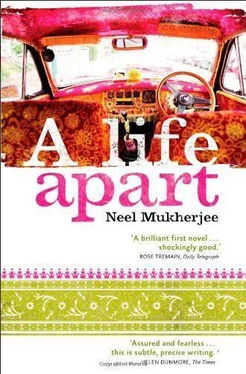I have written at length and now I think I should sign off lest this should become more prolix and tax your energies. Send me your news, dear friend, and let me know if you want me to talk to Mr Roy Chowdhury regarding any help you need for your school. My continuing best wishes for its success and smooth running and to you my love and affection. I remain ever
Yours truly,
Maud.
P.S.: Give my love to Jane and Christopher. They must have grown quite beyond recognition now. Are they doing well at school? Think of me.
There is a sudden great influx of men at all hours, but especially during the evenings, in the ground floor offices and study. There are important meetings, some lasting till very late at night; Miss Gilby can hear the murmur of departing voices and, sometimes, their coaches and traps, well after midnight. There are lots of heated, passionate exchanges, many of them in English, but she hasn’t been able to pick out a telling word or phrase to gather the specific nature of these debates. Bimala tells Miss Gilby that it would be better if the lessons were held in a different place, in Miss Gilby’s own study, or even in Bimala’s room in the andarmahal ; the piano classes are best left to times when there are no visitors. When Miss Gilby asks who these numerous visitors are, Bimala grows vague and then confesses that they are all involved in business with her husband. Miss Gilby suspects that Bimala either doesn’t know the whole truth — for her answer has the ring of incompleteness to it — or she is hiding something from her. Miss Gilby doesn’t press her on this matter any further.
The men who attend these meetings all seem to Miss Gilby to belong to the babu class — English-educated, wealthy, perhaps even holding government positions. They are attired in dhoti and shawls, some carry canes. And where is the gentle Mr Roy Chowdhury in all this? She hasn’t seen him properly for over a week, and when she has (only briefly in passing — they have exchanged polite greetings), the time hasn’t been right for her to ask him about the sudden spate of late night meetings conducted in his offices. And on those brief occasions, he has had a troubled, preoccupied expression on his face, or has she just imagined it?
Afternoon Teas in the English style, complete with cucumber sandwiches, Victoria sponge, plum cake, scones, lead naturally to Bimala’s wish to make Miss Gilby a true lover and connoisseuse of Bengali food. If truth be told, this has been Miss Gilby’s secret wish for a long time, not so much the emphasis on the food and kitchen aspects as on the unobvious corners of another country that don’t reveal themselves unless one is taken by the hand and shown them by someone who lives and moves there with the ease of one born into them. Besides, the lessons with Bimala have fallen so imperceptibly into such a natural pattern of reciprocity, the two women teaching each other things about their own cultures in such a beautiful and harmonious exchange, that it would be inaccurate to call Miss Gilby tutor any longer. She started off as one but then shed that role to occupy more fully the other, companionate one. Could she have asked for any more? How fortunate she was that the very thing she desired, this immersion into the intimate India, which hardly any one of her countrymen knew or showed an interest in knowing, how serendipitous that such designs should be revealed to her. Maybe she will write a novel, a thinly disguised account of her days in this obscure corner of Bengal, and show her countrymen a true picture of this vast country, which they governed but didn’t understand.
So today’s morning lesson on Floral Arrangement — not a lesson, really, but just a pleasant way for the two women to while away their time, gossiping about Bimala’s jaa s, the servants, Mr Roy Chowdhury’s MA years in Calcutta, Miss Gilby’s Club in Calcutta, Violet Cameron’s school, that infamous weekend at the Maharajah of Mysore’s palace, while the flowers lie around as neglected decoration — has been cancelled in favour of a trip to the kitchen.
Miss Gilby has never actually cooked anything in a kitchen before: orders were given to servants and they carried them out. In India, this is one thing she has played by the rules. In the morning, she summoned the cook, planned out the day’s menu, went into the pantry, measured out everything that was needed — if this duty was left to the servants, they stole from you without batting an eyelid — reiterated the orders and instructions and left everything to the cooks and servants. Bimala, too, worked along similar lines: the cook came to her in the morning, she specified what was to be prepared; another servant went to the market and bought fish, meat, groceries; she issued orders — informed the cook that the fish was going to be cooked in a mustard sauce, that Mr Roy Chowdhury felt like lobster, that it was the season for pancakes — and the cook did her bidding. Only occasionally, as a special treat to her husband or a guest, would she do the cooking herself.
This visit to a kitchen, and a true Bengali kitchen, not one in an Anglo-Indian household run by a memsahib and staffed by Indian servants, is going to be a novel experience for Miss Gilby. She is not sure her heart is wholly in this business but it is Bimala’s wish and she is, all said and done, curious to know how a native woman runs her household and her servants. Do the servants pull the wool over her eyes as well? Do they steal? Are they recalcitrant at times? Miss Gilby is eager to pick up any useful tips that might, in the future, enable her to get more value from her servants, more peace of mind with them.
The servants have been warned weeks in advance of a visit by a memsahib to their domain. Bimala has asked them not to giggle, stare, or worry that the kitchen is going to be polluted by the presence of a Christian. When Bimala and Miss Gilby enter the kitchen, the three women working inside immediately pull up their aanchol and cover their heads: the movement is so fast and instinctive, it could be almost involuntary. They turn away, refusing to look, and stare at the stone floor, crushed by shyness. Bimala gives out orders in such rapid Bengali that Miss Gilby is left searching for an isolated word or two whose meaning she might understand and thereby make some sense of what she has said.
Bimala turns to Miss Gilby. ‘We will make something special. A Bengali special food. You will see?’
‘Yes, of course, but what is it?’
‘You will see,’ Bimala repeats mysteriously. One of the women goes to a corner of the kitchen and carries a bucket to the centre. She pulls out a giant fish from it. It is still thrashing, overpowering the woman in whose hands it cannot be contained. It slips out of her small hands and lands on the stone floor with a wet thud, flailing around in that dry, alien world, starved of its own element. An excited chatter breaks out among the servants while Bimala, excited too, moves away a few feet from the beating fish and asks for someone to get hold of it. Two of the servants come forward — one grasps the head, the other the tail — gabbling away constantly. The captured fish still convulses, struggling to get free. Bimala says to Miss Gilby, ‘This is rui , a favourite Bengali fish.’
The third servant gets out a bonti , an enormous sharp curved blade, like a broad, flattened question mark, attached to a wooden stand at right angles, and sets it down on the floor. Bimala shouts out something; everybody is talking all at once, very loudly. The servant with the bonti grabs hold of the fish with difficulty — Bimala, standing well away from the centre, shouts again, ‘Carefully, carefully’ — while another servant fetches her some ash with which she smears her hand while letting go of the fish momentarily, then catches it firmly by its head and neck, leaving the torso and the tail to lash about vigorously all over again. Holding the bonti down with her right foot and the fish with both hands she sets its head against the blade and with rapid sawing motions severs it from the rest of the body. A loud cheer goes up, there is blood on her hands and on the floor, Bimala says, ‘The head is for you, Miss Gilby. It is our special dish.’ She turns around just in time to catch Miss Gilby falling in a faint.
Читать дальше












